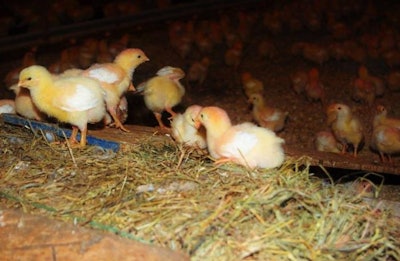
Perdue Foods’ new animal care commitments are about meeting the needs of the customer and the animal, according to the company’s corporate and veterinary leadership.
On a June 27 conference call, Perdue Farms Inc. Chairman Jim Perdue and Dr. Bruce Stewart-Brown, senior vice president of food safety, quality and live production, explained the reasoning behind the company’s welfare commitment. The pair outlined specific steps the Salisbury, Maryland, integrator is taking and will take to meet its goals.
Perdue said the commitment is ultimately about caring for chickens the company and its growers raise. He said it will be a multi-year effort based on input from animal welfare experts, scientific research and animal activist groups who’ve criticized the company in the past.
“This is involving more than 2,000 farmers (and) thousands of Perdue associates who have animal care as part of their management responsibilities. So it’s a huge effort for a company of our size to communicate what we’re going to do, how we’re going to do it, how we’re going to measure ourselves going forward, and we think it’s very exciting,” Perdue said. “The company is fully behind this. Our associates are behind it, our farmers are behind it and, at the end of the day, the beneficiary will be our chickens who are going to be in a much better environment.”
Perdue said the animal care platform has four main planks:
- Giving animals what they need to be happy.
- Connecting the message with Perdue’s contract growers.
- Growing transparency and trust with the consumers.
- Creating a culture of animal care at the company.
Stewart-Brown reviewed how, and why, the company will be changing its production practices.
The five freedoms
Stewart-Brown said Perdue’s husbandry changes originate from its 10 years of work on moving toward antibiotic-free, No Antibiotics Ever, production and its five years of work producing organic-certified chicken. During that time, Stewart-Brown said, the company was challenged to learn, and use, new production practices.
The experience also introduced Perdue to the five freedoms concept:
- Freedom from hunger and thirst.
- Freedom from discomfort.
- Freedom from pain, injury or disease.
- Freedom to express natural behaviors.
- Freedom from fear and distress.
Stewart-Brown said Perdue is making changes across the board to address those five key issues.
For freedom from hunger and disease, Stewart-Brown said the company already removed all animal byproducts and antibiotics from its feed and added phytogenic and probiotic products to strengthen the birds’ immune systems. From now on, the first feed the animal gets must be “spectacular” in order to develop a strong immune system, build strong bones and help the chicken be healthy as it grows, he said.
For freedom from discomfort, Perdue is already working on better controlling the temperature inside the broiler house and giving the birds more space to rest and move around. Now, Stewart-Brown said, Perdue is introducing stimuli like bales of straw, perches, ramps and specialized boxes allowing the animals to express natural behaviors and recreate while inside the chicken house. Perdue is also instructing its growers to build windows into the walls of their houses to give birds access to natural light. For the past 20 years, he said, growers used artificial light almost exclusively.
One Perdue grower, Georgie Cartanza, from Camden, Delaware, said her barns were retrofitted with the windows about a year and a half ago, and “it’s one of the best things I’ve seen in a really long time.”
“For me, personally, I’m happier to be in there, the house is much brighter. I find it more comfortable and I think the birds like it as well because you can definitely see a change in the bird activity,” Cartanza said. “I think this also gives the birds a more natural sense of sunrise and sunset and the birds definitely play more and I definitely think it indicates they are much more content.”
Cartanza, a grower for 10 years who runs four, 160,000-bird broiler houses for Perdue, said the enrichments installed in her houses are increasing the birds' activity level and boosting the animals’ quality of life.
For freedom from fear and distress and freedom from pain, Perdue is introducing controlled atmosphere stunning for all its birds. The method, which asphyxiates the animals, rendering them unconscious, before they are slaughtered, is already used at Perdue’s lone turkey processing plants and will be expanded to one of its chicken processing plants in 2017. The rest of its locations will use the technique in the future. Stewart-Brown said the transport from the farm to the plant is often stressful and can lead to injuries as birds are collected and hung on the processing line. This method will eliminate those injuries and reduce stress in the animals.
Communicating with farmers and customers
Stewart-Brown echoed Jim Perdue’s message about creating a culture of animal care. That commitment includes working with the farmers to educate them on what the changes mean to them, listening to their input on how best to care for the animals and working together to promote the continued well-being of the animals. Perdue is open to modifying its contract structure to reflect the welfare requirements, too, he said.
The company will also stress transparency to ensure the consumers understand how the company is caring for the birds and the efforts it is making to meet the commitment. Stewart-Brown said that means being honest, owning up to shortcomings when they appear, and doing everything possible to fix problems that are identified.
Stewart-Brown said the final part of the commitment is sticking to the plan from here on out.
“It’s forever. It’s not an initiative that’s over; it’s a way that you do business.” Stewart-Brown said. “We intend to put an update on this program in our commitment every year with new initiatives. I know we’ll have more timelines as it relates to some of the initiatives we put in there, but we wanted to get that in front of everybody and show you where we’re going.”
Measured praise from animal welfare activists
In statements provided by Perdue, animal welfare advocates offered qualified praise of the company’s efforts to prioritize animal welfare.
“We commend Perdue for being the first major poultry company to publish such a detailed policy on animal welfare. This announcement shows their willingness to disclose where they are at and where they are going in terms of improving the lives of chickens,” Leah Garces, executive director of Compassion in World Farming, said in a statement. “Time will tell what this means for the birds, but it is a momentous first step in the right direction.”
“Perdue’s new animal welfare policy is precedent setting, and while we look forward to the company adopting timelines for achieving its goals, it’s important progress from a major poultry producer,” Josh Balk, senior director of food policy at The Humane Society of the United States, said in a statement. “The shift toward controlled atmosphere slaughter is a particularly important animal welfare improvement.”


















